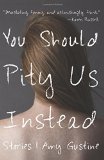Summary | Excerpt | Reading Guide | Reviews | Beyond the Book | Readalikes | Genres & Themes | Author Bio

 Book Reviewed by:
Book Reviewed by:
Rory L. Aronsky
Buy This Book
The pig farmer and the other man leave. A boy remains, stationed inside the kitchen doorway. He watches her with a look of amusement alternating with blankness, as if he's having brief seizures. Over the next hour two new men look in on her, each asking why she is here. She tells them her son is in Gaza and pulls out the older photographs. The men have all looked through her purse, but only for weapons. They showed no interest in the pictures.
At one point a woman comes in holding a newborn and looks to the boy. He gives no indication of approval or disapproval, so she sits down to nurse.
"Was it a difficult birth?" R's mother asks in her passable Arabic.
"Easy," she says. "It is my fourth."
"Any more?"
"If Allah desires." The woman's tone says Allah is a pesky boss. "My first was hard." She dips her head to indicate the boy. "Fifteen hours and he gets stuck."
The woman describes her other children's births and then the tales of nieces and nephews, neighbors and friends. Sick babies, big babies, small babies, babies who can't wait, and babies who must be coaxed free. Babies who die.
"If Allah wants so many babies," the woman asks, "why make them die?"
More men come, blindfold R's mother and put her in a car. In a new kitchen two of them get down on the floor, heads inside a cabinet whose pressboard doors have swollen from water damage and cracked along the edge. They work silently, then pull the cabinet free to reveal a hole in the floor lined by wooden braces that act as both wall and ladder. One of the men helps her get a footing. As she descends, surprised by the muscle required to lower oneself into the earth, the air grows cooler and begins to taste of sulfur and iron. Breathing becomes difficult and her fingers begin to spasm from gripping the wooden braces.
At the bottom a man hands her a blanket. "Cold."
The tunnel is twice the width of her shoulders, its height an inch above her own. Light bulbs dangle from exposed wires, and cigarette butts dot the dirt floor. Every six feet a wooden brace supports the roof. She fears losing her resolve, but the nonchalance of the men emboldens her, and she dares to ask why the tunnel smells of fish.
"You don't let them take to the water," her Egyptian guide explains, rubbing index to thumb in the universal symbol of cash, "so we bring them fish."
At the tunnel's end her guide fits a harness around her and uses a phone on the wall to give the order to lift. Three men pulley R's mother from the earth. Her first glimpse of Gaza is a girl's bedroom with blue birds flying in lonely, far-flung formation across a pink wall. In the corner four children sit on a dingy yellow bedspread playing a game with stones and broken crayons. One of the men unbuckles the harness and motions for her to follow him. They walk through a room which several families have divided with blankets and out the door to a dark street. The man is gone, the door shut, while R's mother is still thinking about who painted those lonely birds.
Excerpted from You Should Pity Us Instead by Amy Gustine. Copyright © 2016 by Amy Gustine. Excerpted by permission of Sarabande Books. All rights reserved. No part of this excerpt may be reproduced or reprinted without permission in writing from the publisher.





The House on Biscayne Bay
by Chanel Cleeton
As death stalks a gothic mansion in Miami, the lives of two women intertwine as the past and present collide.

The Flower Sisters
by Michelle Collins Anderson
From the new Fannie Flagg of the Ozarks, a richly-woven story of family, forgiveness, and reinvention.

The Funeral Cryer by Wenyan Lu
Debut novelist Wenyan Lu brings us this witty yet profound story about one woman's midlife reawakening in contemporary rural China.
Your guide toexceptional books
BookBrowse seeks out and recommends the best in contemporary fiction and nonfiction—books that not only engage and entertain but also deepen our understanding of ourselves and the world around us.